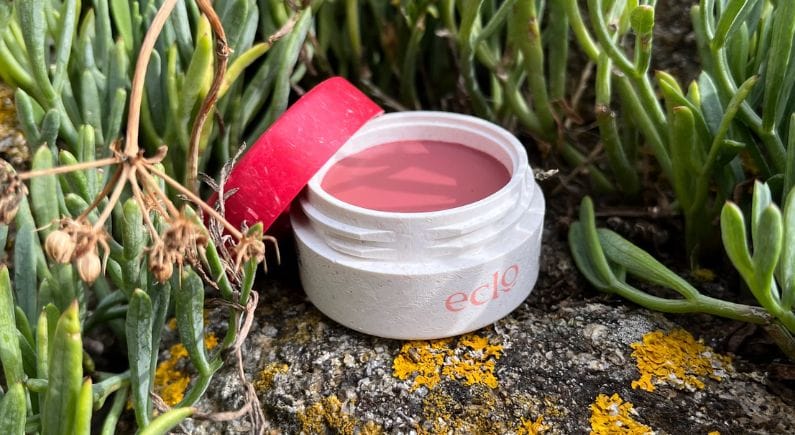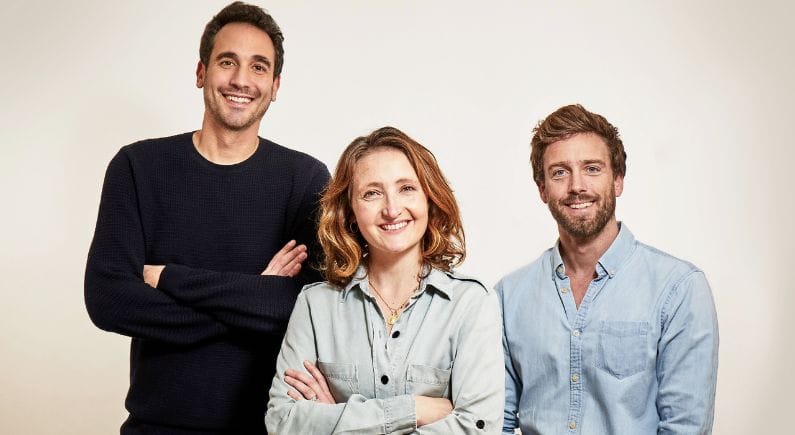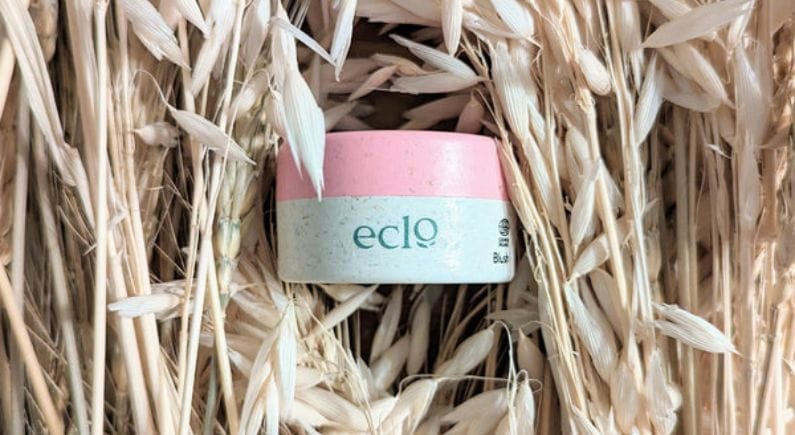
Eclo Beauty on how regenerative sourcing is helping the beauty industry
Launched in 2022, Eclo Beauty is a 100% natural makeup line focused on regenerative sourcing following a 2 years development.
Eclo was initially launched in France on Ulule with + 3000% of the target and has been available in beauty retail stores in France since July 2022. The brand is also available in Direct to Consumer (DTC) through their website.
Founders include Priscille Charton CEO of the brand (and former Coty marketing executive), and also Julien Callède and Marin Susac.

The brand initially launched with lip and eye products and released a foundation range in 2023. Their primary packaging is biodegradable and made from the Sulapac material - a wood base fully biodegradable resin - and their secondary packaging includes FSC paper.
The entire range was created for direct application with fingers. For eye and makeup initially, and now for the face. Priscille had a vision of texture and feel for the application of makeup without the need for applicators.
“ Make-up artists, who tried the product, really enjoy the Eclo Beauty range’s simple and yet smooth application thanks to enjoyable textures and colours. There is no better tool than your finger sometimes! ” explains Charton.
The brand is focused on regenerative sourcing. The approach of Regenerative agriculture offers a sustainable and promising alternative to conventional farming methods which focuses on soil regeneration, preserving biodiversity, water retention and long-term sustainability.
“ These principles aim to create healthy, resilient and productive agricultural ecosystems while promoting biodiversity and reducing the environmental footprint. At Eclo, we favour ingredients such as hemp, rye, seaweed, horsetail and comfrey, which are good for the soil and have a regenerative effect on it, when developing our formulas.” explain the brand.
“ Regenerative sourcing offers numerous benefits. It restores soil health, improves its ability to retain water and nutrients, reduces erosion and promotes carbon sequestration. for example, the rye we use for their blushes and foundations has many benefits for the soil, grown using this method:
- Improved soil structure: rye's roots are very long and extensive (up to 600 km), penetrating deep into the soil and helping to aerate and break up the soil. This improves soil structure, allowing better circulation of air, water and nutrients.
- Promotes biodiversity: Rye provides a habitat and food source for many beneficial organisms such as earthworms and soil micro-organisms. It therefore promotes biodiversity and the ecological balance of the soil.
- Nutrient absorption: Rye has an excellent capacity to absorb nutrients from the soil, including nitrogen. This reduces nutrient leaching, contributing to more efficient use of fertilisers and reduced water pollution.

The benefits of regenerative agriculture in cosmetics are manifold. Ingredients derived from this method are often of higher quality, rich in nutrients and free from harmful chemicals. What's more, these ingredients support local farmers and farming communities, promoting ethical and sustainable practices.
By choosing cosmetic products derived from regenerative agriculture, consumers are contributing to a more sustainable way of life. They are supporting brands that are committed to environmental protection, social responsibility and transparency.”
Beyond sourcing
Regenerative agriculture and sourcing is one step in creating a more sustainable and more resilient future. The principle of a regenerative economy ensures the safe existence of all parties connected to wealth creation, not just investors and the end of the chain.
Regeneration means genuine and profound sustainability. We explain this in our definition of sustainable beauty where the People, the Planet and the Profit are all interconnected. It means ensuring that the planet recovers and is regenerated after our use.
Instead of just taking, using and discarding, we must ensure at every step of the way that there is a creation of value that nourishes the earth (meaning fauna and flora) the farmer and its environment. It can be actions to train farmers for improved skills, better treatment of the soil, and more secure harvests while improving their quality of life. It is ensuring that biodiversity is thriving and animal welfare is respected.
Regeneration implies a holistic approach or a more full-circle approach. It is not about just one’s surroundings but it is considering the entire chain involved.

We think that truly sustainable development (or regeneration) will take one or two generations to implement as it’s a complete turn-around of societal organisation, but we already see a strong step in the right direction with the valorisation of waste in Europe for instance.
Let me explain. Until now, waste or discarded products had no value. Today, regulations are imputing Recycled content requirements into new product development. It means that product manufacturers must add waste into their innovations. Since brands do not want to create poor quality by adding waste materials into manufactured products they have to work on improving waste management for better waste matters. We already see the stream of PET material being streamlined for better inputs and outputs. The same is happening with glass recycling.
Regeneration is a long-term goal, that will require investments, but it is possible. The question remains of the Success of companies that is still measured in financial terms only, and the bottom line is always to make more profits while reducing costs. This is where decoupling might be an interesting concept. Increasing Economic Value while Decreasing resource use.
“ The concept of “decoupling” is used to refer to the end of the correlation between increased economic production and decreased environmental quality (IRP 2011). On this abstract level, the term intends to name a phenomenon where, contrary to the majority of past experience, economic growth happens without concomitant growth in use of material resources or negative environmental impact. “


